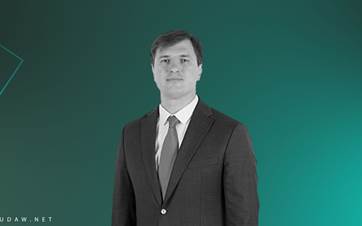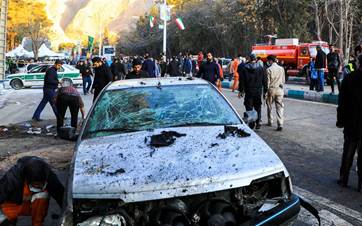Opinions


Military vehicles and equipment, parts of the S-400 air defense systems, are unloaded from a Russian transport aircraft at Murted military airport in Ankara, Turkey, July 12, 2019. Photo: Turkish Defence Ministry / pool / AP
At the end of last week Turkey finally began taking delivery of the Russian S-400 air defense system. In various speeches to his supporters, President Erdogan expressed the belief that the American reaction to this would not amount to much.
Mr. Erdogan said on Sunday that US President Trump “has the authority to waive or postpone CAATSA” – US sanctions designed to prevent countries buying military equipment from Russia. He added: “Since this is the case, it is Trump who needs to find the middle ground.”
Turkish sources and commentators seem to have a very different perspective on the issue than American ones. In a July 14 piece for The National Interest, Turkish scholar Ali Demirdas likens the issue to an infamous incident in Turkish policy-making circles: the June 5, 1964 “Johnson Letter” in which US President Johnson threatened Turkey with an arms embargo and a withdrawal of NATO protection should it invade Cyprus.
The American threats embitter Turkish officials to this day, and only served to postpone (by 10 years) rather than avert a Turkish invasion of Cyprus. The 1964 episode also pushed Turkey closer to the Soviet Union according to Demirdas.
From the Turkish point of view, Turkey has done nothing wrong by working to secure its national interests. Demirdas, for instance, ascribes Turkey’s current tilt towards Russia as stemming from mostly American blunders. Chief amongst these is what he and other Turks describe as “the US insistence in creating and unconditionally backing an autonomous, Kurdish-dominated entity in Syria.”
“Trump’s threat that ‘Turkey’s economy would be devastated if it attacked Kurds in Syria’ gave the Turks an indication that the United States would easily sacrifice Turkey for a non-state actor,” Demirdas added.
Sinan Ulgen, chairman of an Istanbul-based think tank, likewise maintains that “No other policy decision in history has done as much harm to the image of the United States in Turkey as the ongoing effort to weaponize the [People’s Protection Units] YPG. Washington may have indeed seen this entity as a useful group in the fight to defeat the Islamic State, but the cost has been the total alienation of Ankara.”
Besides the Syrian Kurdish issue, Fethullah Gulen and his movement’s continued enjoyment of a safe haven in the United States added another major irritant to US-Turkey relations. President Erdogan holds Gulen responsible for the failed coup attempt of July 15, 2016, and sees the American’s refusal to extradite him as an indicator of US government acquiescence or even support for a coup in Turkey.
During that coup attempt, rebel-piloted American fighter aircraft bombed Turkey’s parliament and came close to shooting down Mr. Erdogan’s Istanbul-bound plane as well. As a result, Turkey needs a good air defense system capable of shooting down even its own American-made planes, so the logic goes. Some argue that tensions over Cyprus and gas deposits there might likewise give Turkey a need to shoot down Greek or Israeli American-supplied aircraft.
In these Turkish perspectives, NATO allies and their threats of arms embargoes and sanctions make for unreliable friends – leading to a Turkish pivot eastwards. Turkish commentators seem to completely ignore everything the US did and does for them, however. It was the US that captured Abdullah Ocalan in Kenya and handed him over to Turkey, and it was American helicopters and commando training that allowed the Turkish state to gain the upper hand against the Kurdistan Workers’ Party (PKK) in the latter half of the 1990s. America shielded Turkey from Armenian genocide resolutions for decades and was the biggest backer of Turkey’s accession to the European Union. For years, Turkey was also one of the biggest recipients of both military and economic aid from the US.
For all this, what did Turkey do for the Americans since Mr. Erdogan’s AKP came to power? They refused to allow US troops to transit through Turkey during the 2003 Iraq war, leading the US to rely on Iraqi Kurds for a much more limited northern front in that war. Ankara then made bitter accusations that Washington was helping Iraqi Kurds create a state and issued threats and ultimatums over Kirkuk and similar issues, even sending a team of commandos to instigate trouble in Kirkuk via the Turkmen community there (which led to the Americans having to arrest the Turkish commandos in Sulaimani). Anti-American Turkish rhetoric, often coming from the highest official circles, grew steadily worse in the meantime.
After the civil war in Syria erupted, Turkey inserted itself into some of the most extremist Islamist groups of Syria. Mr. Erdogan even had to have several of Turkey’s most revered journalists arrested for breaking a story about covert Turkish aid to these radical Islamist groups in Syria. During this time, Ankara also – until quite late in the game – refused to let its NATO allies use the base they shared with Turkey at Incirlik to conduct air raids against the so-called Islamic State. German MPs were not even allowed to visit their troops at Incirlik, leading NATO allies to withdraw Patriot missile systems they placed in Turkey at Ankara’s request.
When the siege of Kobani was occurring in 2014, Turkey refused to take action against ISIS fighters right on their border. This is what led to the US partnership with the Syrian Kurdish pro-PKK forces – the only capable Syrian group willing to fight the Islamists. In deference to Turkey, however, that partnership has been far from unconditional and involved next to no US political support for “creating … an autonomous, Kurdish-dominated entity in Syria”.
The Turkish viewpoint ignores all of this, seeing Turkey as the unappreciated stalwart US ally now forced to find alternative friends. In the process and with the purchase of the S-400s from Russia, officials in Ankara may have just made what a journalist writing for Ha’aretz calls “a strategic blunder, perhaps Ankara’s worst since its 1974 invasion of Cyprus”.
Mr. Erdogan said on Sunday that US President Trump “has the authority to waive or postpone CAATSA” – US sanctions designed to prevent countries buying military equipment from Russia. He added: “Since this is the case, it is Trump who needs to find the middle ground.”
Turkish sources and commentators seem to have a very different perspective on the issue than American ones. In a July 14 piece for The National Interest, Turkish scholar Ali Demirdas likens the issue to an infamous incident in Turkish policy-making circles: the June 5, 1964 “Johnson Letter” in which US President Johnson threatened Turkey with an arms embargo and a withdrawal of NATO protection should it invade Cyprus.
The American threats embitter Turkish officials to this day, and only served to postpone (by 10 years) rather than avert a Turkish invasion of Cyprus. The 1964 episode also pushed Turkey closer to the Soviet Union according to Demirdas.
From the Turkish point of view, Turkey has done nothing wrong by working to secure its national interests. Demirdas, for instance, ascribes Turkey’s current tilt towards Russia as stemming from mostly American blunders. Chief amongst these is what he and other Turks describe as “the US insistence in creating and unconditionally backing an autonomous, Kurdish-dominated entity in Syria.”
“Trump’s threat that ‘Turkey’s economy would be devastated if it attacked Kurds in Syria’ gave the Turks an indication that the United States would easily sacrifice Turkey for a non-state actor,” Demirdas added.
Sinan Ulgen, chairman of an Istanbul-based think tank, likewise maintains that “No other policy decision in history has done as much harm to the image of the United States in Turkey as the ongoing effort to weaponize the [People’s Protection Units] YPG. Washington may have indeed seen this entity as a useful group in the fight to defeat the Islamic State, but the cost has been the total alienation of Ankara.”
Besides the Syrian Kurdish issue, Fethullah Gulen and his movement’s continued enjoyment of a safe haven in the United States added another major irritant to US-Turkey relations. President Erdogan holds Gulen responsible for the failed coup attempt of July 15, 2016, and sees the American’s refusal to extradite him as an indicator of US government acquiescence or even support for a coup in Turkey.
During that coup attempt, rebel-piloted American fighter aircraft bombed Turkey’s parliament and came close to shooting down Mr. Erdogan’s Istanbul-bound plane as well. As a result, Turkey needs a good air defense system capable of shooting down even its own American-made planes, so the logic goes. Some argue that tensions over Cyprus and gas deposits there might likewise give Turkey a need to shoot down Greek or Israeli American-supplied aircraft.
In these Turkish perspectives, NATO allies and their threats of arms embargoes and sanctions make for unreliable friends – leading to a Turkish pivot eastwards. Turkish commentators seem to completely ignore everything the US did and does for them, however. It was the US that captured Abdullah Ocalan in Kenya and handed him over to Turkey, and it was American helicopters and commando training that allowed the Turkish state to gain the upper hand against the Kurdistan Workers’ Party (PKK) in the latter half of the 1990s. America shielded Turkey from Armenian genocide resolutions for decades and was the biggest backer of Turkey’s accession to the European Union. For years, Turkey was also one of the biggest recipients of both military and economic aid from the US.
For all this, what did Turkey do for the Americans since Mr. Erdogan’s AKP came to power? They refused to allow US troops to transit through Turkey during the 2003 Iraq war, leading the US to rely on Iraqi Kurds for a much more limited northern front in that war. Ankara then made bitter accusations that Washington was helping Iraqi Kurds create a state and issued threats and ultimatums over Kirkuk and similar issues, even sending a team of commandos to instigate trouble in Kirkuk via the Turkmen community there (which led to the Americans having to arrest the Turkish commandos in Sulaimani). Anti-American Turkish rhetoric, often coming from the highest official circles, grew steadily worse in the meantime.
After the civil war in Syria erupted, Turkey inserted itself into some of the most extremist Islamist groups of Syria. Mr. Erdogan even had to have several of Turkey’s most revered journalists arrested for breaking a story about covert Turkish aid to these radical Islamist groups in Syria. During this time, Ankara also – until quite late in the game – refused to let its NATO allies use the base they shared with Turkey at Incirlik to conduct air raids against the so-called Islamic State. German MPs were not even allowed to visit their troops at Incirlik, leading NATO allies to withdraw Patriot missile systems they placed in Turkey at Ankara’s request.
When the siege of Kobani was occurring in 2014, Turkey refused to take action against ISIS fighters right on their border. This is what led to the US partnership with the Syrian Kurdish pro-PKK forces – the only capable Syrian group willing to fight the Islamists. In deference to Turkey, however, that partnership has been far from unconditional and involved next to no US political support for “creating … an autonomous, Kurdish-dominated entity in Syria”.
The Turkish viewpoint ignores all of this, seeing Turkey as the unappreciated stalwart US ally now forced to find alternative friends. In the process and with the purchase of the S-400s from Russia, officials in Ankara may have just made what a journalist writing for Ha’aretz calls “a strategic blunder, perhaps Ankara’s worst since its 1974 invasion of Cyprus”.
|
|
David Romano has been a Rudaw columnist since 2010. He holds the Thomas G. Strong Professor of Middle East Politics at Missouri State University and is the author of numerous publications on the Kurds and the Middle East. |









Comments
Rudaw moderates all comments submitted on our website. We welcome comments which are relevant to the article and encourage further discussion about the issues that matter to you. We also welcome constructive criticism about Rudaw.
To be approved for publication, however, your comments must meet our community guidelines.
We will not tolerate the following: profanity, threats, personal attacks, vulgarity, abuse (such as sexism, racism, homophobia or xenophobia), or commercial or personal promotion.
Comments that do not meet our guidelines will be rejected. Comments are not edited – they are either approved or rejected.
Post a comment